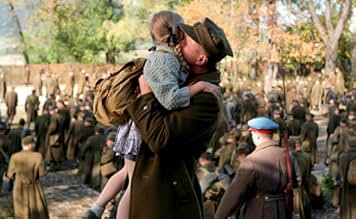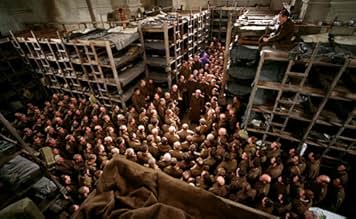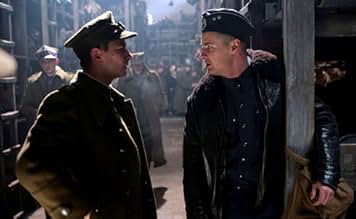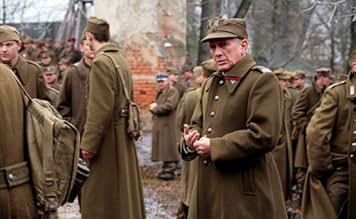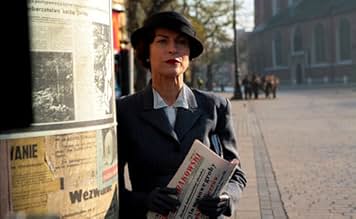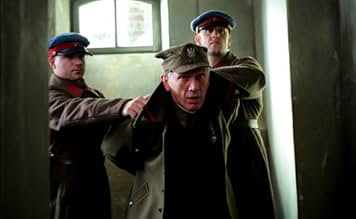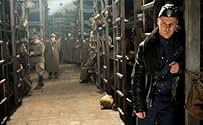IMDb-BEWERTUNG
7,0/10
17.932
IHRE BEWERTUNG
Eine Untersuchung der sowjetischen Schlachtung von Tausenden polnischen Offizieren und Bürgern im Katyn-Wald im Jahr 1940.Eine Untersuchung der sowjetischen Schlachtung von Tausenden polnischen Offizieren und Bürgern im Katyn-Wald im Jahr 1940.Eine Untersuchung der sowjetischen Schlachtung von Tausenden polnischen Offizieren und Bürgern im Katyn-Wald im Jahr 1940.
- Für 1 Oscar nominiert
- 14 Gewinne & 14 Nominierungen insgesamt
Joachim Paul Assböck
- Obersturmbannführer Bruno Müller
- (as Joachim Assböck)
Empfohlene Bewertungen
I watched "Katyn" on a home computer screen. Even in that limited format, "Katyn" had an impact on me comparable to such cinematic greats as "Lawrence of Arabia." I cried throughout most of the film. I resolved that many of my relationships would be different. I remembered people I had known who reminded me of characters in the movie. After the film ended, I felt that I could not listen to the radio or read the newspaper or listen to anyone speak. I just needed to allow the film to sink into me.
Naysayers have critiqued "Katyn" as boring and dull. If you need a film to depict war, occupation, and atrocity as shiny, compact, and compelling as a sports car, then you should listen to those naysayers; don't watch "Katyn," rather, watch the very silly, teen fanboy-friendly Quentin Tarantino flic, "Inglorious Bastards." If you've seen enough Hollywood productions jam-packed with sexy Nazis and happy endings, and you want to take in a film that dares to depict, in eyeblinks, what war, atrocity, and occupation looked like and felt like to real people, then by all means see "Katyn." One of the many features that I admired: "Katyn"'s Nazis are not sexy. They are not Tom Cruise, Liam Neeson, Christoph Waltz. "Katyn"'s Nazis are brutal, repugnant thugs.
I respect this movie. There are too few movies about which I'd say that. It shows the courage not to attempt to weave an uplifting, feel-good atrocity narrative that leaves the viewer with a smile. This isn't "Schindler's List." "Schindler's List" is a very good movie, but this isn't that. It is, rather, very much like what World War Two and the subsequent Soviet occupation sounded like to me when I listened to my own older friends and relatives, who lived through both. This is disjointed narrative, stories that seem headed for redemption or even ecstasy but that end in random death, that end in aborted normalcy, aborted joy, aborted meaning. I felt, in watching these cold, pale, stoic characters, as if I were, once again, sitting across the table from older Eastern European friends and relatives. Yes, that's what they looked like. Yes, those are the facial expressions they assumed when they talked about the uncle who was rounded up and never heard from again, the daring, handsome lad who ended up in a mass grave – or when they pointedly did *not* talk about these people. The gravestone whose inscription dares to tell the truth; the tearing down of a propaganda poster; the Red Army soldier who struggles to do the right thing by a widow, who won't yet admit that she is a widow; the singing of exactly the right Christmas carol at exactly the right moment: those are exactly the heroic gestures that no one ever saw, that went unrecorded, that only one person lived to tell about, to tell me. Here they are, on screen.
When a movie is named "Katyn" the viewer knows how it will end; it's kind of like a movie named "Auschwitz" or "Kolyma" or "Wounded Knee." There isn't going to be a surprise ending. I was still surprised by the ending, by how courageous and moving I found it. Once again, Andrzej Wajda managed to wow the film-goer in me. And he managed to move the human in me.
See "Katyn." See a movie you can respect, a movie that is worth your time.
Naysayers have critiqued "Katyn" as boring and dull. If you need a film to depict war, occupation, and atrocity as shiny, compact, and compelling as a sports car, then you should listen to those naysayers; don't watch "Katyn," rather, watch the very silly, teen fanboy-friendly Quentin Tarantino flic, "Inglorious Bastards." If you've seen enough Hollywood productions jam-packed with sexy Nazis and happy endings, and you want to take in a film that dares to depict, in eyeblinks, what war, atrocity, and occupation looked like and felt like to real people, then by all means see "Katyn." One of the many features that I admired: "Katyn"'s Nazis are not sexy. They are not Tom Cruise, Liam Neeson, Christoph Waltz. "Katyn"'s Nazis are brutal, repugnant thugs.
I respect this movie. There are too few movies about which I'd say that. It shows the courage not to attempt to weave an uplifting, feel-good atrocity narrative that leaves the viewer with a smile. This isn't "Schindler's List." "Schindler's List" is a very good movie, but this isn't that. It is, rather, very much like what World War Two and the subsequent Soviet occupation sounded like to me when I listened to my own older friends and relatives, who lived through both. This is disjointed narrative, stories that seem headed for redemption or even ecstasy but that end in random death, that end in aborted normalcy, aborted joy, aborted meaning. I felt, in watching these cold, pale, stoic characters, as if I were, once again, sitting across the table from older Eastern European friends and relatives. Yes, that's what they looked like. Yes, those are the facial expressions they assumed when they talked about the uncle who was rounded up and never heard from again, the daring, handsome lad who ended up in a mass grave – or when they pointedly did *not* talk about these people. The gravestone whose inscription dares to tell the truth; the tearing down of a propaganda poster; the Red Army soldier who struggles to do the right thing by a widow, who won't yet admit that she is a widow; the singing of exactly the right Christmas carol at exactly the right moment: those are exactly the heroic gestures that no one ever saw, that went unrecorded, that only one person lived to tell about, to tell me. Here they are, on screen.
When a movie is named "Katyn" the viewer knows how it will end; it's kind of like a movie named "Auschwitz" or "Kolyma" or "Wounded Knee." There isn't going to be a surprise ending. I was still surprised by the ending, by how courageous and moving I found it. Once again, Andrzej Wajda managed to wow the film-goer in me. And he managed to move the human in me.
See "Katyn." See a movie you can respect, a movie that is worth your time.
Are there words to express suffering, injustice, hypocrisy of war? May empathy ease the pain of those who lost hope for a better world?
There are many movies on WWII that appear to be more or less captivating, touching as well as educational. And, in this respect, we could easily rate this movie in that way if we treat KATYN as yet another film on WWII. However, the case here is different, more to say exceptionally unique.
Andrzej Wajda, after 18 years since the downfall of communist regime, fulfills the duty he feels to his parents and all Polish Patriots and makes a film on the theme that, not long ago, was not only forbidden to discuss in theater or cinema, but in all public places, the Truth that was prohibited and highly unwelcome, the Truth about the slaughter of more than 20,000 Polish best officers committed by Soviet communists in the forests of Katyn. Andrzej Wajda based his film on Andrzej Mularczyk's story POST MORTEM and consulted great Katyn witnesses, including recently deceased Priest Zdzislaw Peszkowski (1918-2007). If the film is good or weak belongs to the opinions of particular viewers. But lots of people on the premiere day stated that it's a historic work. Why?
KATYN, though a movie, is a wonderful documentary that supplies the viewer with TRUTHFUL information on what really happened in 1940, why it happened and who did this (facts that were most distorted in many historical books and many other sources for years). Here, the truth is more important than anything else. The movie contains archive footage, pictures and terrific narrator. These moments are well balanced and, though appearing several times, do not disturb anything but make for all the rest. And what is the rest?
The rest contains particularly vivid plots of families, their dreams, their fear, husbands/sons' honor, wives' love and care, and foremost young officers' martyrdom. The story of Andrzej (Artur Zmijewski) is exceptionally moving. His situation seems to represent the Poland of that time: torn between two oppressors, two worlds: Nazi Germany who attacked it on September, the 1st, 1939 and communist Russia who attacked it from the east 17 days later. As a victim of Katyn massacre, Andrzej appears to tell us a tragic story of separation, extreme suffering, but hope, to the very last day, the hope for survival. His notebook seems to tell us: "No, I will live, they're taking us somewhere but I'll surely see my beloved woman, my loving mum and my sweet daughter." The tragic though full of hope Christmas Eve also depicts that attitude. Other characters, including Jerzy (Andrzej Chyra), Andrzej's wife Anna (Maja Ostaszewska), General's wife (Danuta Stenka) constitute a brilliant insight into various, usually helpless, reactions towards evil, hypocrisy, injustice, cruelty and neutrality.
These stories are executed in an accurate and universal way. In such historic but tragic content, there is usually a tendency to become either too preachy or too emotional, which, to some extend, jerk the tears from viewers' eyes by force. Wajda does not do anything of these. He remains with the people, with humanity in general, does not give the final answer to anything. He seems to be with all of us and appears to depict a quest for truth, quest for justice and for humanity. Besides, he uses lots of very accurate symbols. The unforgettable and probably most thought provoking symbol is when Andrzej's wife looks for her husband and uncovers the bodies of soldiers. Among them, she occurs to uncover the figure of Christ taken from the Cross in church and laid among the deceased. Haven't we killed God by losing respect for life? Another brilliant symbol is when Russian soldiers tear the Polish flag into two parts, hanging the red part again as the Russian flag and using the white part as a foot dressing.
Except for the factors described above, KATYN is also a wonderful piece of work as a film. Very good cinematography, moody atmosphere, flawless performances. Artur Zmijewski does a brilliant job as Andrzej, Maja Ostaszewska is genuine as his wife and heroic, in a sense, Maja Komorowska is again a real artist in her job giving a real portrayal of the caring and then mourning mother. And Andrzej Chyra as Jerzy whose conscience and solidarity do not allow him to go on...magnificent!
But at the end I must tell you that it was not easy for me to write this review. The stories like this one do not lead to wordy comments, much noise, opinions, praise or criticism. They call for silence, the sacred silence that lets us honor those who died in such inhumane way. This silence shall constitute a significant message for today's generation, shall help us see deeper and give us faith to believe that their lives did not end in the soil. Therefore, though difficult, I consider KATYN one of the most important movies I have seen in my life.
Yes, dear young Patriot, hold Your Rosary high. The world will probably call your act "the act of despair". Yet, the world is befriended with lie and you are now victorious in a world of Glory and Eternal Light where there is no room for "lie". R.I.P.
There are many movies on WWII that appear to be more or less captivating, touching as well as educational. And, in this respect, we could easily rate this movie in that way if we treat KATYN as yet another film on WWII. However, the case here is different, more to say exceptionally unique.
Andrzej Wajda, after 18 years since the downfall of communist regime, fulfills the duty he feels to his parents and all Polish Patriots and makes a film on the theme that, not long ago, was not only forbidden to discuss in theater or cinema, but in all public places, the Truth that was prohibited and highly unwelcome, the Truth about the slaughter of more than 20,000 Polish best officers committed by Soviet communists in the forests of Katyn. Andrzej Wajda based his film on Andrzej Mularczyk's story POST MORTEM and consulted great Katyn witnesses, including recently deceased Priest Zdzislaw Peszkowski (1918-2007). If the film is good or weak belongs to the opinions of particular viewers. But lots of people on the premiere day stated that it's a historic work. Why?
KATYN, though a movie, is a wonderful documentary that supplies the viewer with TRUTHFUL information on what really happened in 1940, why it happened and who did this (facts that were most distorted in many historical books and many other sources for years). Here, the truth is more important than anything else. The movie contains archive footage, pictures and terrific narrator. These moments are well balanced and, though appearing several times, do not disturb anything but make for all the rest. And what is the rest?
The rest contains particularly vivid plots of families, their dreams, their fear, husbands/sons' honor, wives' love and care, and foremost young officers' martyrdom. The story of Andrzej (Artur Zmijewski) is exceptionally moving. His situation seems to represent the Poland of that time: torn between two oppressors, two worlds: Nazi Germany who attacked it on September, the 1st, 1939 and communist Russia who attacked it from the east 17 days later. As a victim of Katyn massacre, Andrzej appears to tell us a tragic story of separation, extreme suffering, but hope, to the very last day, the hope for survival. His notebook seems to tell us: "No, I will live, they're taking us somewhere but I'll surely see my beloved woman, my loving mum and my sweet daughter." The tragic though full of hope Christmas Eve also depicts that attitude. Other characters, including Jerzy (Andrzej Chyra), Andrzej's wife Anna (Maja Ostaszewska), General's wife (Danuta Stenka) constitute a brilliant insight into various, usually helpless, reactions towards evil, hypocrisy, injustice, cruelty and neutrality.
These stories are executed in an accurate and universal way. In such historic but tragic content, there is usually a tendency to become either too preachy or too emotional, which, to some extend, jerk the tears from viewers' eyes by force. Wajda does not do anything of these. He remains with the people, with humanity in general, does not give the final answer to anything. He seems to be with all of us and appears to depict a quest for truth, quest for justice and for humanity. Besides, he uses lots of very accurate symbols. The unforgettable and probably most thought provoking symbol is when Andrzej's wife looks for her husband and uncovers the bodies of soldiers. Among them, she occurs to uncover the figure of Christ taken from the Cross in church and laid among the deceased. Haven't we killed God by losing respect for life? Another brilliant symbol is when Russian soldiers tear the Polish flag into two parts, hanging the red part again as the Russian flag and using the white part as a foot dressing.
Except for the factors described above, KATYN is also a wonderful piece of work as a film. Very good cinematography, moody atmosphere, flawless performances. Artur Zmijewski does a brilliant job as Andrzej, Maja Ostaszewska is genuine as his wife and heroic, in a sense, Maja Komorowska is again a real artist in her job giving a real portrayal of the caring and then mourning mother. And Andrzej Chyra as Jerzy whose conscience and solidarity do not allow him to go on...magnificent!
But at the end I must tell you that it was not easy for me to write this review. The stories like this one do not lead to wordy comments, much noise, opinions, praise or criticism. They call for silence, the sacred silence that lets us honor those who died in such inhumane way. This silence shall constitute a significant message for today's generation, shall help us see deeper and give us faith to believe that their lives did not end in the soil. Therefore, though difficult, I consider KATYN one of the most important movies I have seen in my life.
Yes, dear young Patriot, hold Your Rosary high. The world will probably call your act "the act of despair". Yet, the world is befriended with lie and you are now victorious in a world of Glory and Eternal Light where there is no room for "lie". R.I.P.
Everyone in Poland has heard of the Katyn massacre but I've been surprised and saddened at how few people in Britain know of the atrocity. In the early part of the Second World War, more than 4,000 Polish soldiers were executed in the Katyn forest near Smolensk in western Russia. This was part of an organised effort to eradicate the military, political and intellectual leadership of Poland and a series of executions in various other locations removed some 22,000 Poles from their loved ones and their nation.
So, who did this? The Germans claimed to have uncovered the bodies in 1943 and blamed the Soviets in an effort to embarrass and divide the Allies. The Soviet Union categorically denied the crime at the time and for decades afterwards, only in 1990 admitting what the Poles and any independent assessor of the evidence knew: Stalin's NKVD perpetrated the horror on his express command.
The incident has now been made into a major Polish film by the acclaimed Polish director Andrzej Wajda whose own father was killed at Katyn and who is now in his 80s. The work was premiered at the Berlin film festival in 2007; it was nominated for the Academy Award for Best Foreign Film in 2008; and it finally arrived in Britain in a few cinemas in the summer of 2009. It is an exceptional work - both powerful and moving - that deserves a much larger audience.
Starting in 1939 with the simultaneous invasion of Poland by the Nazis and the Soviets, it takes us in several jumps to the immediate post-war period and underlines that the shame of Katyn was not just the deaths of the 22,000 in 1940 but the denial of the truth by so many people for so many years afterwards. Through the device of a prolonged flashback, the film concludes with a return to Katyn with close-up scenes of the sheer brutality of what was unquestionably a war crime.
The film is based on a novel by Andrzej Mularczyk and revolves around a number of fictional families with a fair bit of location work in Krakow, a city centre that looks today much like it did in the 1940s and which I have visited. The photography and acting are both excellent and selective use of wartime film footage simply adds to the sense of verisimilitude.
Footnote: To my utter astonishment, at the Renoir cinema in central London where I saw the film, as I descended the stairs to the screen, I was given a leaflet by a representation of something called The Stalin Society which insisted that the massacre was carried out by the Germans in 1943 and that Wajda's film is simply part of a sustained attempt to discredit communism at a time of economic crisis when so many people would see it as the obvious alternative to capitalism.
So, who did this? The Germans claimed to have uncovered the bodies in 1943 and blamed the Soviets in an effort to embarrass and divide the Allies. The Soviet Union categorically denied the crime at the time and for decades afterwards, only in 1990 admitting what the Poles and any independent assessor of the evidence knew: Stalin's NKVD perpetrated the horror on his express command.
The incident has now been made into a major Polish film by the acclaimed Polish director Andrzej Wajda whose own father was killed at Katyn and who is now in his 80s. The work was premiered at the Berlin film festival in 2007; it was nominated for the Academy Award for Best Foreign Film in 2008; and it finally arrived in Britain in a few cinemas in the summer of 2009. It is an exceptional work - both powerful and moving - that deserves a much larger audience.
Starting in 1939 with the simultaneous invasion of Poland by the Nazis and the Soviets, it takes us in several jumps to the immediate post-war period and underlines that the shame of Katyn was not just the deaths of the 22,000 in 1940 but the denial of the truth by so many people for so many years afterwards. Through the device of a prolonged flashback, the film concludes with a return to Katyn with close-up scenes of the sheer brutality of what was unquestionably a war crime.
The film is based on a novel by Andrzej Mularczyk and revolves around a number of fictional families with a fair bit of location work in Krakow, a city centre that looks today much like it did in the 1940s and which I have visited. The photography and acting are both excellent and selective use of wartime film footage simply adds to the sense of verisimilitude.
Footnote: To my utter astonishment, at the Renoir cinema in central London where I saw the film, as I descended the stairs to the screen, I was given a leaflet by a representation of something called The Stalin Society which insisted that the massacre was carried out by the Germans in 1943 and that Wajda's film is simply part of a sustained attempt to discredit communism at a time of economic crisis when so many people would see it as the obvious alternative to capitalism.
This excellent movie is a vivid portrayal about war. War has rarely been rendered in such an horrid, utterly grim manner, especially in its final part. Harrowing, unnerving epic which depicts the horror of war as a woman named Anna (Maja) roams the Russian detachments to find his prisoner husband (Arthur Zmijewski) during invasion and other stories. As Anna , her daughter and mother-in-law live in hopes which the father has survived . As a general's (Jan Eglert) wife keeps silence when a Russian officer obligate her to accuse the Germans of her husband's death. Furthermore the Anna's nephew whose father was killed at Katynn is pursued by Russian military for defacing an advertisement cartel . The story contains some overwhelming sequences as the massacre across the Katyn wood and including some actual documentary. It packs a sensible and spectacular musical score by the classic musician Krzystof Penderecki. Evocative and colorful cinematography by Pawel Edelman, usual of Roman Polanki and Wadja. The motion picture has splendidly been directed by the veteran Andrzej Wadja, the best Polish director who made classics as ¨Pan Tadeusz, Danton, The promised land, Kanal¨ among others.
The historic events in which this movie are based result to be the following : Hitler wanted to avoid facing a possible alliance of the Soviet Union , Britain and France. The Western democracies were equally aware of the Soviets' potential to deter German expansion but their negotiations with Stalin did not lead to any agreement. At the same time, however, Hitler had set aside his ideological differences with Stalin in the hopes of making an alliance. In August 1939 he offered Stalin a deal : If the Soviets allowed Germany to attack Western Poland , they would receive eastern Poland and Baltic states. The Munich capitulation of France and Britain to Hitler's demands convinced that they would be unreliable allies . He decided that he had to cope with German expansion eastward on his own, without their help. In late August 1939, German foreign Secretary Joachin Von Ribentropp visited Moscow to sign with Molotov a German-Soviet Nonagression Pact , which included the deal over territory. The agreement between two nations at opposite political extremes, fascism on one side , communism on the other, shocked the world. It also left Hitler with a free hand in Poland. Hitler used an apparent Polish raid on a Radio Station in the German border town of Gleiwitz as an excuse to invade Poland the following day , September 1, 1939. Two days later, on September 3, France and Britain declared war on Germany, WWII had begun. Beaten back by the Germans, Polish forces were now attacked from the east. The Soviet dictator Joseph Stalin ordered his Red Army to cross into eastern Poland. He claimed that he wanted to prevent anarchy caused by the collapse of Polish government. Thousands of Soviet troops poured across the border and raced west to link up with German troops. Organized Polish resistance to the invaders collapsed. In the last week of September Polish troops in Modlin and Warsaw surrounded to the Germans, A small garrison of 4.500 men held out on the Hel Peninsula near Danzing until October 2. Some 694.000 Polish were seized by the victorious Germans and more than 217.000 Poles were rounded up by the Red Army. Both the Germans and Soviets treated the Poles with great brutality. Stalin ordered most of his prisoners deported to the Gulag (a system brutal labor camps) and later taking more than 20.000 officer prisoners were executed in secret.
The historic events in which this movie are based result to be the following : Hitler wanted to avoid facing a possible alliance of the Soviet Union , Britain and France. The Western democracies were equally aware of the Soviets' potential to deter German expansion but their negotiations with Stalin did not lead to any agreement. At the same time, however, Hitler had set aside his ideological differences with Stalin in the hopes of making an alliance. In August 1939 he offered Stalin a deal : If the Soviets allowed Germany to attack Western Poland , they would receive eastern Poland and Baltic states. The Munich capitulation of France and Britain to Hitler's demands convinced that they would be unreliable allies . He decided that he had to cope with German expansion eastward on his own, without their help. In late August 1939, German foreign Secretary Joachin Von Ribentropp visited Moscow to sign with Molotov a German-Soviet Nonagression Pact , which included the deal over territory. The agreement between two nations at opposite political extremes, fascism on one side , communism on the other, shocked the world. It also left Hitler with a free hand in Poland. Hitler used an apparent Polish raid on a Radio Station in the German border town of Gleiwitz as an excuse to invade Poland the following day , September 1, 1939. Two days later, on September 3, France and Britain declared war on Germany, WWII had begun. Beaten back by the Germans, Polish forces were now attacked from the east. The Soviet dictator Joseph Stalin ordered his Red Army to cross into eastern Poland. He claimed that he wanted to prevent anarchy caused by the collapse of Polish government. Thousands of Soviet troops poured across the border and raced west to link up with German troops. Organized Polish resistance to the invaders collapsed. In the last week of September Polish troops in Modlin and Warsaw surrounded to the Germans, A small garrison of 4.500 men held out on the Hel Peninsula near Danzing until October 2. Some 694.000 Polish were seized by the victorious Germans and more than 217.000 Poles were rounded up by the Red Army. Both the Germans and Soviets treated the Poles with great brutality. Stalin ordered most of his prisoners deported to the Gulag (a system brutal labor camps) and later taking more than 20.000 officer prisoners were executed in secret.
A well done picture speaking for those who cannot speak for themselves and would be gladly considered never existing by some.
Although it's difficult to credibly and adequately convey the horror of such a murder which became a life tragedy for many Polish families and undoubtedly affected the way Poland looked after the war I think the director made a good job. Especially so, that it happened to be his personal tragedy as well.
Despite that the movie is well-balanced with emotions and atmosphere. Modest colors and anxious music by Penderecki emphasize the horror of those who were waiting. Short cuts of brutal scenes of murder leave speechless. No additional comment is needed.
Although it's difficult to credibly and adequately convey the horror of such a murder which became a life tragedy for many Polish families and undoubtedly affected the way Poland looked after the war I think the director made a good job. Especially so, that it happened to be his personal tragedy as well.
Despite that the movie is well-balanced with emotions and atmosphere. Modest colors and anxious music by Penderecki emphasize the horror of those who were waiting. Short cuts of brutal scenes of murder leave speechless. No additional comment is needed.
Wusstest du schon
- WissenswertesThe director's father was killed in this massacre. Andrzej Wajda was only 13 years old then. His father's remains were never found.
- PatzerTur says to Ewa, "Haven't you seen that Disney's "The Sleeping Beauty", remember?" That movie was first released fourteen years after 1945, so this may be a mistranslation in the subtitles for "Snow White".
- VerbindungenFeatured in The 80th Annual Academy Awards (2008)
- SoundtracksPolish Requiem For 4 Solo Voices, Choir And Orchestra
Written by Krzysztof Penderecki
Performed by Polish State Philharmonic Orchestra
Top-Auswahl
Melde dich zum Bewerten an und greife auf die Watchlist für personalisierte Empfehlungen zu.
- How long is Katyn?Powered by Alexa
Details
- Erscheinungsdatum
- Herkunftsland
- Offizieller Standort
- Sprachen
- Auch bekannt als
- Katyn
- Drehorte
- Produktionsfirmen
- Weitere beteiligte Unternehmen bei IMDbPro anzeigen
Box Office
- Budget
- 4.000.000 € (geschätzt)
- Bruttoertrag in den USA und Kanada
- 118.095 $
- Eröffnungswochenende in den USA und in Kanada
- 11.053 $
- 22. Feb. 2009
- Weltweiter Bruttoertrag
- 14.768.451 $
- Laufzeit2 Stunden 2 Minuten
- Farbe
- Sound-Mix
- Seitenverhältnis
- 2.35 : 1
Zu dieser Seite beitragen
Bearbeitung vorschlagen oder fehlenden Inhalt hinzufügen

